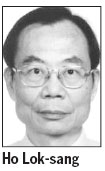Favoring Hong Kong people in home purchases
Updated: 2011-06-14 07:24
By Ho Lok Sang(HK Edition)
|
|||||||
Housing prices in Hong Kong have continued to zoom skywards. According to the Centaline City Leading Index, existing home prices rose another 1.3 percent to 100.72 last week, the highest level in 13 years.
Against this backdrop, the Hong Kong Monetary Authority (HKMA) announced on Friday that it is to tighten up mortgage lending. For homes costing HK$7 million or more, buyers whose main source of income is through Hong Kong can borrow at most 60 percent of the value of the home. Other buyers can borrow no more than 50 percent. There is also an upper dollar value for loans, of HK$4.2 million for homes valued up to HK$7 million, and HK$5 million for homes valued up to HK$10 million. For homes costing more than $10 million, the maximum loan is no more than 50 percent of the value of the house. The tighter loan ratio for non-Hong Kong-based buyers (in terms of their principal income source) also applies.

This is the first time the SAR government has adopted different rules for Hong Kong and non-Hong Kong-based people. It marks a watershed.
All along the SAR government has maintained that with Hong Kong being an international financial center that allows for the free flow of capital, it must not discriminate against investors based outside of the city. This principle seems reasonable, and it is also an important concern, because Hong Kong has to be a successful international financial center in order for it to survive.
Equally important, however, is Hong Kong people's need for security by having their own homes. The difficulty is to reconcile these two equally important concerns.
The loan ratio should also essentially be an instrument for risk management. By raising the loan ratio, the degree of leveraging can be reduced, and this will provide a bigger cushion for banks in the event that home prices decline. From this standpoint, buyers whose incomes are not based in Hong Kong have to be "riskier" in order to justify the lower loan ratio. But there is little reason to believe that people whose principal income source is from overseas are in fact riskier.
However, the SAR government is obviously trying to use the loan ratio as an instrument to curb speculative purchases. People whose principal income source is from outside Hong Kong are less likely to buy the properties as their principal residences.
Following this logic, one wonders why the SAR government does not simply specify that the lower loan ratio will apply to anyone who does not use the purchased property as their principal residence. And therefore that the higher loan ratio would apply for purchasers who use the purchased properties as their principal residences and who purchase the properties in their own names, rather than through the name of a limited company.
This way there is no discrimination between Hong Kong-based and non-Hong Kong-based buyers, and we will thus better preserve the image that the city does not discriminate against overseas investors.
Of course, there is also another tool that will help Hong Kong people attain the security of having their own homes, without causing the perception of discrimination against overseas buyers.
That of course is the Home Ownership Scheme (HOS), a subject on which I have already written about several times in this column previously. The HOS serves principally to provide Hong Kong people with an opportunity to buy their own homes - a relatively basic unit that provides the requisite amount of security but not much luxury. There is much evidence that the HOS is more cost effective than the public rental housing program in meeting Hong Kong people's housing needs. At a seminar on housing organized by the Hong Kong Business and Professionals Federation, Marco Wu, vice-chairman of the Hong Kong Housing Society, pointed out that the land premiums paid by the owners who sold their units last year amounted to HK$1.7 billion. This is no small sum. The HOS also allowed 200,000 public housing units to be made available again to people waiting in the queue. Since HOS housing is not intended as an investment vehicle, not opening it to foreign buyers does not constitute it as a discriminatory policy.
I am all in favor of the HKMA relying on adjusting the loan-to-price ratio to achieve its risk management goals. Its new requirement, that purchasers without an income stream can borrow at most 40 percent of the value of the homes, is well justified on these grounds.
However, I cannot agree to using the loan-to-price ratio as an instrument to bring about changes in housing prices. Housing prices should be market-based. Anyone can make his own judgment as to whether they are excessively high, but not the government. The government's role is to ensure that there is adequate supply to meet the demand - but not excessive supply. It also has the responsibility of helping Hong Kong people meet their housing needs.
Its new land supply program, announced simultaneously with the new loan measures, is doing just that, and is a step in the right direction. I also applaud the decision of allowing developers greater flexibility in deciding the relative supply of bigger versus smaller units.
But I continue to hope that the SAR government will bring back the HOS program, sooner rather than later, and in quantities that will make a difference.
The author is director of the Centre for Public Policy Studies, Lingnan University.
(HK Edition 06/14/2011 page3)